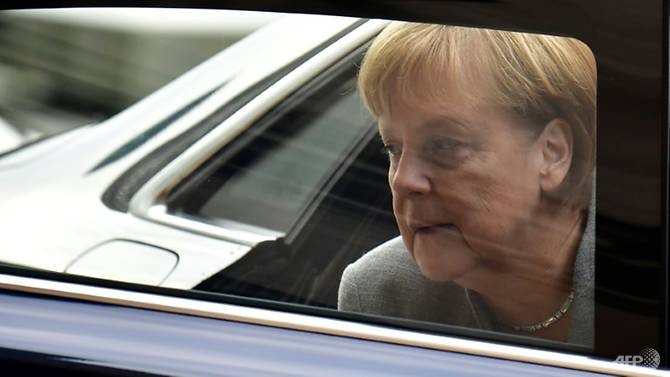Merkel, Macron to front diplomatic push at UN climate talks
 |
| German Chancellor Angela Merkel is due to give a "high-level" speech, along with UN chief Antonio Guterres and French President Emmanuel Macron AFP/Tobias SCHWARZ |
Despite announcing it will withdraw from the Paris Agreement, the United States has a delegation at the Bonn huddle, tasked with drawing up rules for executing the hard-fought pact on winding down Earth-warming greenhouse gas emissions from burning coal, oil and gas.
Washington's presence is not universally appreciated, especially after White House officials hosted a sideline event Monday defending the continued use of fossil fuels.
"A lot of negotiators are not happy with the way the US has been behaving in some of these negotiations," Alden Meyer of the Union of Concerned Scientist, a veteran observer of the climate process, told AFP.
"Things like this fossil fuel initiative ... are not making things easier."
The United States, which championed the Paris Agreement under former president Barack Obama, ratified it just two months before Donald Trump - who has described climate change as a "hoax" - was voted into office.
In June, the new president announced America would pull out of the historic pact.
This week, Syria became the 196th country to adopt the agreement, leaving the United States as the only nation in the UN climate convention to reject it.
Bureaucrats have been haggling over the Paris Agreement rulebook for the past nine days. Now it is the turn of energy and environment ministers to unlock issues above the pay grade of rank-and-file negotiators.
The goal is to draft a set of decisions to be adopted before the meeting ends on Friday.
Along with UN chief Antonio Guterres, French President Emmanuel Macron and German Chancellor Angela Merkel will kick off Wednesday a day-and-a-half of back-to-back "high-level" speeches.
NOT A HOLIDAY
"Ministers speaking at the UN summit in Bonn on Wednesday have a big job to do. This meeting is not making progress on some key issues," said Mohamed Adow of Christian Aid, which represents the interests of poor countries at the talks.
"It almost feels like negotiators have taken this Fiji-led summit and treated it as if they are on holiday in the Pacific."
The Paris Agreement commits countries to limiting average global warming to under 2°C over Industrial Revolution levels, and 1.5°C if possible, to avert calamitous climate change-induced storms, drought and sea-level rises.
To bolster the agreement, nations submitted voluntary commitments to curb greenhouse gas emissions from fossil fuel burning.
But the 1°C mark has already been passed, and scientists say that on current country pledges, the world is headed for a 3°C warmer future, or more.
Armelle le Comte of Oxfam said Merkel and Macron must signal that they will lead by example.
"It is the moment to show that the French-German couple is dynamic and ambitious on these questions," she told AFP.
But Merkel is in a tough spot.
Coal provides about 40 per cent of Germany's electricity needs, and the country is set to miss its own goal to cut emissions by 40 per cent by 2020 from 1990 levels.
"Chancellor Merkel over the years has been a great climate champion and has driven the global debate forward," said Jennifer Morgan, executive director of Greenpeace.
"But that credibility is hanging in the balance."
Outstanding issues for ministers to solve include a demand from poorer countries for firm financing commitments to help them prepare for, and deal with, the fallout from climate change.
What the stars mean:
★ Poor ★ ★ Promising ★★★ Good ★★★★ Very good ★★★★★ Exceptional
Latest News
More News
- Russian President congratulates Vietnamese Party leader during phone talks (January 25, 2026 | 09:58)
- Worldwide congratulations underscore confidence in Vietnam’s 14th Party Congress (January 23, 2026 | 09:02)
- Political parties, organisations, int’l friends send congratulations to 14th National Party Congress (January 22, 2026 | 09:33)
- 14th National Party Congress: Japanese media highlight Vietnam’s growth targets (January 21, 2026 | 09:46)
- 14th National Party Congress: Driving force for Vietnam to continue renewal, innovation, breakthroughs (January 21, 2026 | 09:42)
- Vietnam remains spiritual support for progressive forces: Colombian party leader (January 21, 2026 | 08:00)
- Int'l media provides large coverage of 14th National Party Congress's first working day (January 20, 2026 | 09:09)
- Vietnamese firms win top honours at ASEAN Digital Awards (January 16, 2026 | 16:45)
- ASEAN Digital Ministers' Meeting opens in Hanoi (January 15, 2026 | 15:33)
- ASEAN economies move up the global chip value chain (December 09, 2025 | 13:32)
















 Mobile Version
Mobile Version